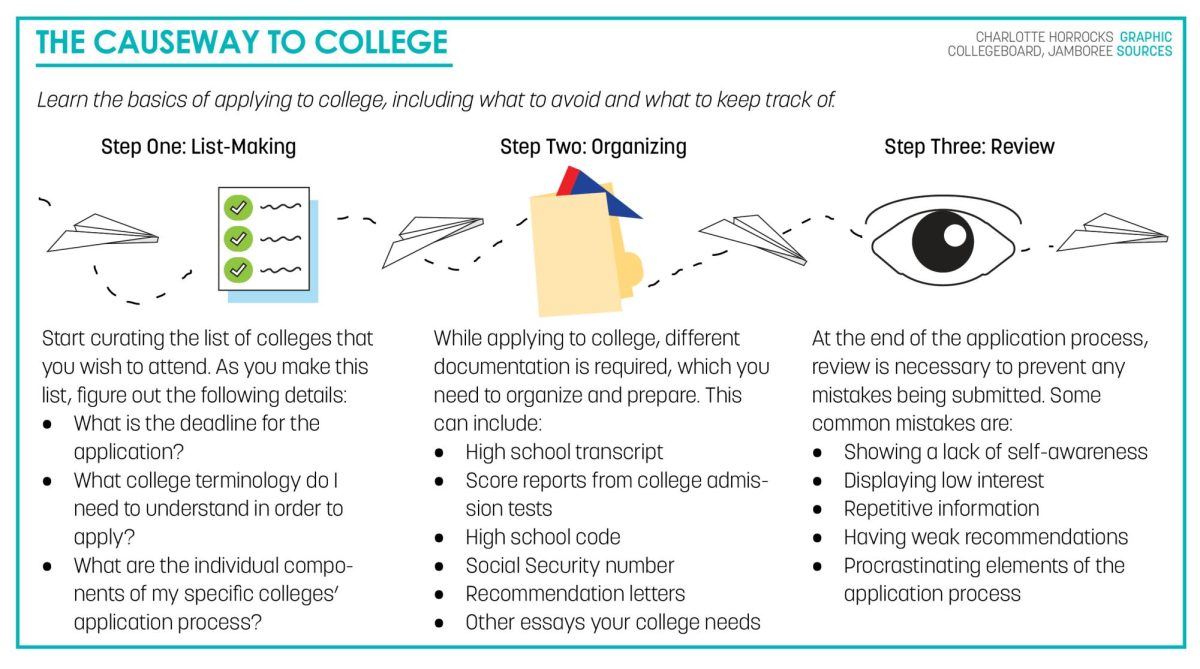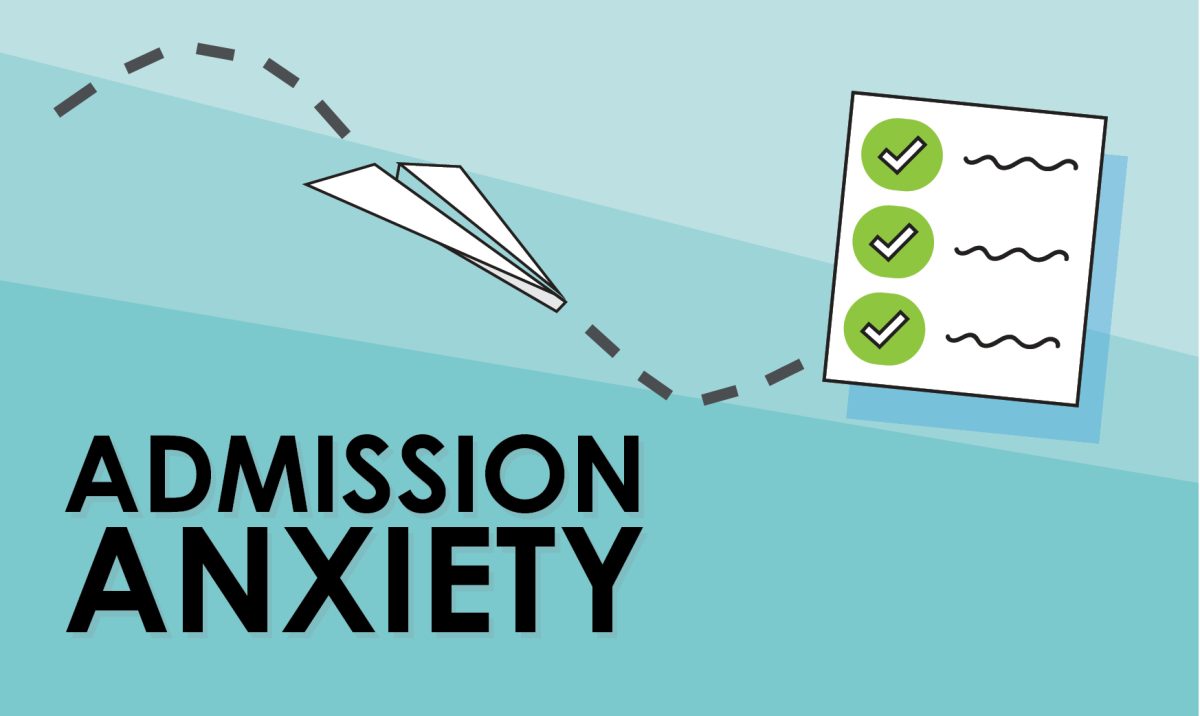For junior Gabrielle Richmond, the college application process has added many items to her ever-growing juggling-act. Alongside keeping up with heavy coursework, extracurriculars including a busy choir schedule, and maintaining a social life, Richmond said she struggled with finding time to navigate the intimidating process of applying to college.
“When I started looking into colleges, I felt so overwhelmed,” she said. “It was like a flood of information, and I didn’t even know what I was even doing at the time. There were so many forms I was filling out, and so many sites I was visiting, and they just seemed to make me feel even more lost.”
Richmond is far from alone in feeling stressed about the college applications process—in their annual College Hopes and Worries Survey, the Princeton Review reported that in 2023, 72% of American students report high to very high levels of stress about the college admissions process. Up 16% from the 2003 version of the survey, this number of stressed students is on the rise nationwide. But what exactly causes such a drastic rise in anxiety surrounding the process?
“I think it’s because the world as a whole is becoming more and more of a stressor,” sophomore Sam Falkenstein said. “We’re always very pressured, especially at Carmel, to be the very best, and to focus on every way we can get ahead. And because we’ve been in this hyper-competitive environment, it’s hard to understand that it’s not normal.”

Melinda Stephan, College Career and Resource Center (CCRC) coordinator, said she shares Falkenstein’s views. She said she has observed the role competition plays in creating the atmosphere of worry. Seeing firsthand their peers’ increased academic successes, she said, students feel pressure to fit in and do the same. While this aspiration of self-improvement may initially seem positive, she said, prioritizing it to an unhealthy extent has now become one of the main causes behind college applications stress.
“(Students) see their older peers having success with admission to competitive schools and they want to do that too,” Stephan said. “And there’s nothing wrong with that, it’s just that they need a balanced approach to their strategy.”
For Stephan, this idea of a balanced approach involves a strong emphasis on structure and planning ahead.
“I find that students who are organized navigate the process well. They’re planning ahead, creating spreadsheets for deadlines and requirements, and they’re also using the support of the community around them,” Stephan said.
For her part, Richmond said the Counseling Center and the CCRC were especially helpful.
“I know that counseling offers Naviance, where we can keep track of information about applying to college, throughout our time at the high school. I also know that counseling has some people who specialize in helping kids apply to college, which I’ve found pretty helpful,” Richmond said.
Richmond also said she found value in community support in difficult times.
“I find that the most important thing to remember about the process of applying to college is that everyone around you is likely going through the same exact thing,” she said. “Just like I have my bad and stressful moments, they do too (and vice-versa). We’re all more similar than we’d like to think, it’s like a built-in support system, and I feel like we sometimes take it for granted.”































![What happened to theater etiquette? [opinion]](https://hilite.org/wp-content/uploads/2025/04/Entertainment-Perspective-Cover-1200x471.jpg)













































![Review: “The Immortal Soul Salvage Yard:” A criminally underrated poetry collection [MUSE]](https://hilite.org/wp-content/uploads/2025/03/71cju6TvqmL._AC_UF10001000_QL80_.jpg)
![Review: "Dog Man" is Unapologetically Chaotic [MUSE]](https://hilite.org/wp-content/uploads/2025/03/dogman-1200x700.jpg)
![Review: "Ne Zha 2": The WeChat family reunion I didn’t know I needed [MUSE]](https://hilite.org/wp-content/uploads/2025/03/unnamed-4.png)
![Review in Print: Maripaz Villar brings a delightfully unique style to the world of WEBTOON [MUSE]](https://hilite.org/wp-content/uploads/2023/12/maripazcover-1200x960.jpg)
![Review: “The Sword of Kaigen” is a masterpiece [MUSE]](https://hilite.org/wp-content/uploads/2023/11/Screenshot-2023-11-26-201051.png)
![Review: Gateron Oil Kings, great linear switches, okay price [MUSE]](https://hilite.org/wp-content/uploads/2023/11/Screenshot-2023-11-26-200553.png)
![Review: “A Haunting in Venice” is a significant improvement from other Agatha Christie adaptations [MUSE]](https://hilite.org/wp-content/uploads/2023/11/e7ee2938a6d422669771bce6d8088521.jpg)
![Review: A Thanksgiving story from elementary school, still just as interesting [MUSE]](https://hilite.org/wp-content/uploads/2023/11/Screenshot-2023-11-26-195514-987x1200.png)
![Review: "When I Fly Towards You", cute, uplifting youth drama [MUSE]](https://hilite.org/wp-content/uploads/2023/09/When-I-Fly-Towards-You-Chinese-drama.png)
![Postcards from Muse: Hawaii Travel Diary [MUSE]](https://hilite.org/wp-content/uploads/2023/09/My-project-1-1200x1200.jpg)
![Review: "Ladybug & Cat Noir: The Movie," departure from original show [MUSE]](https://hilite.org/wp-content/uploads/2023/09/Ladybug__Cat_Noir_-_The_Movie_poster.jpg)
![Review in Print: "Hidden Love" is the cute, uplifting drama everyone needs [MUSE]](https://hilite.org/wp-content/uploads/2023/09/hiddenlovecover-e1693597208225-1030x1200.png)
![Review in Print: "Heartstopper" is the heartwarming queer romance we all need [MUSE]](https://hilite.org/wp-content/uploads/2023/08/museheartstoppercover-1200x654.png)



